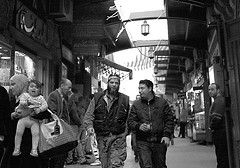At the same time, tensions in Lebanon were escalating. The national army was perhaps the most respected institution in a country still reeling from civil war. Around Beirut, soldiers were a visible presence, with machine gun nests positioned at certain intersections and foot patrols guarding others. So last month, when gunshots tore through the northern town of Tripoli, threatening a different river of red, everyone was relieved that soldiers were there to keep the peace.
Amid the fighting, a friend headed north, where he saw a car full of tough dudes, with big beards and holding machine guns, driving slowly past a group of soldiers. Nothing happened—more water under the bridge—and thanks to the army, we could rest another day.
But it was uneasy rest. Though recent fighting was hours away, I might pass a guy in camo, holding a rifle, on my way to the store. Should I tip my cap? I could buy milk, and for that I was grateful. But who wants to thank the guy with the gun?
The river might run red again, and we still wouldn’t know why, or who had been hurt. Lebanon couldn’t yet answer such questions. This spring, we know two things: Milk gets drunk, and bullets rarely rest forever.
Whatever we did to each other, the blood would wash into the sea.
